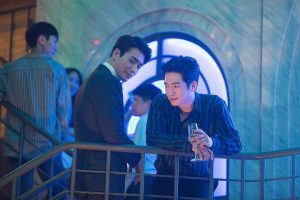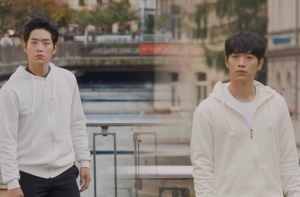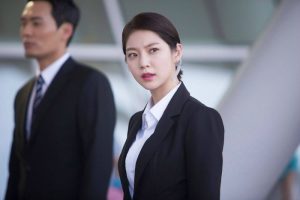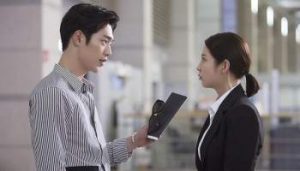
With a budget of about 10 billion won (about 931200.00 USD), a boatload of trailers hyping up its timely summer release, and the casting of charismatic Seo Kang-joon, of Cheese in the Trap and Entourage, as the male lead(s), there was more than sufficient reason to have high expectations for Are You Human Too?. However, the drama debuted to the slightly disappointing ratings of around 5.3%, placing it third in the competition between its other prime time competitors, Wok of Love and Investigation Couple. It has since improved, expectedly, with the overall nationwide ratings for the 8th episode at 6.3%. Was the huge budget a waste on a subpar effort? Or are people simply less inclined to watch sci-fi shows over rom-coms and criminal justice procedurals?
For some plot context, the drama starts in an alternate version of the 90’s. Scientist Dr. Oh Ro-ra (Kim Sung-ryoung), who was exiled from Korea to the Czech Republic, is able to perfect A.I. technology to the point where she can make an exact robot replica of her son, Nam Sin. She develops a series of Namsin robots until she creates Namsin3 (Seo Kang-joon), her adult “son” capable of a full range of tasks. His real life model, Nam Sin (Seo Kang-joon), was kidnapped from his mother by his grandfather Nam Gun-ho (Park Young-gyou) and his lackey Seo Jong-gil (Yu Oh-seong), so that he could become the successor to his company.
In a sequence of events, Namsin3 goes to Korea and temporarily masquerades as a comatose Nam Sin, in order to prevent disarray in Nam Gun-ho’s company. The events leading up to this include an ongoing power struggle between Seo Jong-gil and Nam Sin for the top seat of the company, which leads to Seo jong-gil staging an attempted murder of Nam Sin.

Every once in a while, the drama shifts from the serious tone of the chaebol drama and A.I. subplot into a lighter romcom-esque storyline about one of Nam Sin’s guards, Kang So-bong (Gong Seung-yeon), who gets fired from her job and publicly assaulted by Nam Sin after he catches her taking pictures of him secretly.
Through a very long series of events, So-bong ends up working for Seo Jong-gil, and discovers Namsin3’s machinations and wires, potentially providing him with leverage to oust Nam Sin from the company.
From glancing through a brief overview of the plot, one can deduce that Namsin3 could have easily been replaced by a secret twin in the first half of the story, and the plot during that portion of the drama could have still gone by without a hitch. Nam Sin’s secret twin could have been the one to have lived his whole life in the Czech Republic, and came out to replace him when he got injured. The A.I. component of the drama feels more like something to envigorate what would otherwise be a standard chaebol makjang story, rather than a mainstay of the plot.

There is too much emphasis on the power struggle within the heirs, and too little focus on the place that artificial intelligence occupies in the world of the story. Although the role that Namsin3 plays in the series slowly gains importance as the plot goes on, the part in the beginning of the drama that should have been dedicated to crafting a narrative where the A.I. is indispensable to the series’ world feels wasted.
Of course, a full-on Star Wars level type of worldbuilding feels a bit much to ask from a 16 episode K-drama, but Are You Human Too? could have benefited from some in-depth explanations of technological advancements within the world in which the show occupies — namely, what makes it different from the current world, where A.I. progress is still a considerable distance from the level of Namsin3? And how did Dr. Oh Ro-ra use this technology to her advantage to build Namsin3, when nobody else could even come close to doing the same? These little touches to fleshing out the setting of the drama could have gone a long way to making Namsin3 feel more weaved into the fabric of the story, rather than a tossed-in element to add variability. Because his role feels so transient, later dissection into potentially interesting themes just won’t have the same impact.

After all, the A.I. in Humans perfectly fits into the alternate world full of advanced technology in which the show takes place. Similarly, the series Dollhouse carefully constructed a world exclusive to the series, involving A.I. manipulated by a powerful organization within the confines of their clients’ wants and their enclosed facility. If not for the firm establishment in the beginning of these series of the importance of their A.I. to the setting, would their later commentary about the psychology of robots and humans been as effective? Probably not.
The difficult thing about making a show about A.I. is that so many shows have gone there before, and explored the usual familiar themes with their own nuances and varied conclusions. What is the threshold between human and robot? Can A.I. gain a sense of consciousness or retain memories? Do these abilities really make them human? What does it even mean to be human? Will we ever reach the point of technological singularity? The beauty of these questions is that they are so open-ended, so that every new work of fiction that seeks to dissect them have room to play around with the answers, if the creators decide that there are any. The hard part is making sure that one doesn’t tread familiar ground. For instance, I love Westworld, but I don’t want to see fifty different shows about how retaining memories leads to consciousness in A.I.

That is, to say, that they even attempt to tackle these questions in the first place, which Are You Human Too? seems hesitant to do at this point. It may be too early to come to any conclusions about the nature of A.I. and humanity just yet, but the drama fails to even set up the stage for such philosophical musings. Instead, it effectively sets up the stage for a rich person makjang with romcom elements and a slight sci-fi twist, with the latter element a bit shaky. And because the drama missed the opportunity for proper world-building in the beginning, the sci-fi element will likely always leave much to be desired.
One thing that the drama definitely gets right is its gorgeous visuals and detailed graphics. There are numerous long-distance tracking shots of the expansive, lush, green Czech pastoral landscape. When Nam sin and Namsin3 visit a marketplace, the bright colors and people of the practically pop offscreen. The creators definitely took full advantage of their foreign location. Also, the color-grading is done so that the blue hues of every scene is emphasized, appropriately complementing the cold, industrial, sci-fi theme. The CGI sequences of building the Namsin robots, the lab technology, and the special effects look exceptionally realistic. The scene where the driverless car knocked over and destroyed other cars was one such memorable instance.

One particularly beautiful shot was when Nam Sin and Namsin3 stare at each other from across the street. The symmetry of the cobblestone street and the buildings complement their identical physical appearance and almost gives the illusion of a mirror. The wide angle shot highlights the feeling of awe, confusion, and astonishment that the characters must have felt when seeing each other for the first time, giving a feeling as if they existed in a vacuum of amazement in a moment where everything else ceased to exist.
Another noteworthy scene was the one where the chairman, Hyun-joon (Lee Joon-hyuk), and Namsin3 stand on a ledge of his house overlooking some forest and rocks, with the pool behind them glistening with their reflections. The evening sunsets imbued their sillhouettes in a warm glow, providing an interesting contrast to the tensions between the two family members.
Moving onto the characters, Namsin3 is wide-eyed and innocent, as one would expect of a robot who had a relatively trouble-free life in the Czech countryside sheltered under the protection human mother. Nam Sin is the opposite, jaded by the duplicity and hostility of those around him, while isolated from the outside world by his high status. The grandpa is a standard ruthless, overbearing patriarch and Seo Jong-gil is also a tried archetype. Seo Jong-gil’s daughter, Seo Ye-na (Park Hwan-hee) is the standard betrothed character of the main chaebol; the one whose advances are constantly rebuffed, but persists in doggedly pursuing their fiance anyway. Dr. Oh also doesn’t have much depth as of this moment, beyond her role as mother and creator of the Namsin robots.

One character that is interesting is the female lead, Kang So-bong. Despite her cheery and wholesome demeanor, she seems to harbor less than wholesome morals. At first glance, she seems like a typical plucky girl heroine. However, it becomes clear that she is a subversion of this trope, as she lies to her boss without a second thought about her secret paparazzi activities, while secretly conducting said activities and simultaneously fooling her father into thinking of her as a righteous, upstanding citizen. She does all of this without a shred of guilt, and a seemingly genuine smile on her face.
Her motivations and backstory are revealed through a flashback into her boxing days, where a ref wrongly permitted her opponent to use illegal methods to win against her simply for money. Because of this, she becomes disillusioned by the idea of morality, and begins to see money as the true source of benefit and power. Therefore, it makes sense for her to take money from her boss and Mr. Seo to engage in less than ethical behavior against Nam Sin. However, it seems as if being around Namsin3 is sparking character development for her, as his unwavering honesty and rigid morals are influencing her positively. She even apologizes to him and throws away the tablet she uses to monitor him with in the last episodes.

So, in conclusion, what do most good sci-fi shows have in common? They dedicate time towards the beginning for world-building. And this is especially important for a series revolving around A.I., because it adds some plausibility to the idea of A.I. development, and most importantly, makes sure that the A.I. is an essential part of the plot. Are You Human Too? essentially skips this crucial step. The show takes place in a mostly unchanged present day setting. Even when we see glimpses of the 90’s, the characters are dressed in present day fashions. Furthermore, there isn’t much explanation as to how the technology for building advanced A.I. suddenly comes about.
Why is this alternate version of the 90’s different from the real life 90’s, with its just developing Internet and dinosaur computers, and how does it give Dr. Oh the resources to build Namsin1? The show fails to answer these questions, and instead hands us what looks like a repurposed version of the present that conveniently bestows the ability to create A.I. upon Dr. Oh. The closest thing the viewer gets to a fictional science explanation about how the A.I. comes about is through Dr. Oh’s presentation in the beginning, but even this scene fails to establish technological context for building artificial intelligence in the 90’s. There doesn’t have to be in-depth explanations about the machinations of every single working part of the Namsin robots, but some background information explaining the fictional science behind the A.I. would have helped to build a stronger world where the A.I. would have been more essential to the story.

Some viewers may not have taken issue with the same things I just pointed out. For some, a full-fledged, cerebral sci-fi story pondering the nature of humanity and artificial intelligence may be too heavy for a k-drama, and this mixture of rom-com, chaebol makjang drama, and light sci-fi that Are You Human Too? offers is perfectly done. However, I personally see it as a waste of potential. There are a ton of romcom K-dramas and even more rehashed storylines of chaebol drama laden with various twists in a bid to lose their hackneyed feeling; but there has never once been a K-drama delving deep into the human and robotic consciousness before. And I don’t know about you, but the latter sounds a lot more intriguing to me.
(Images via KBS)


